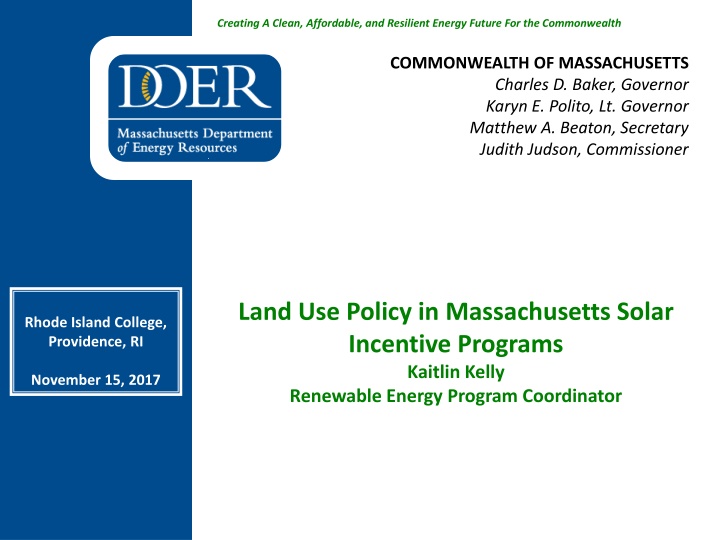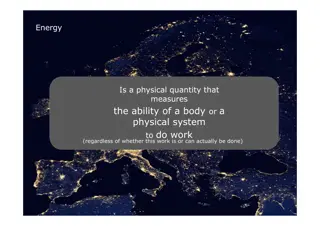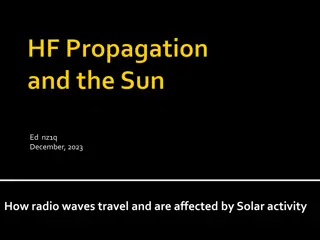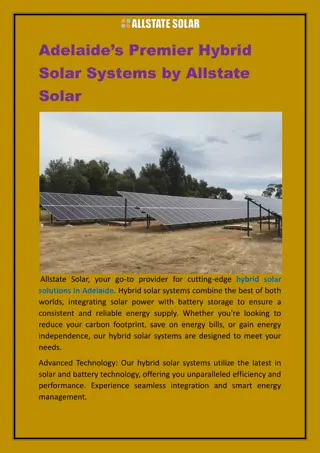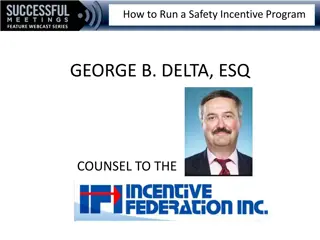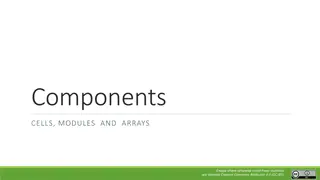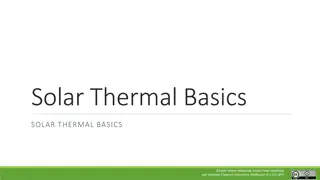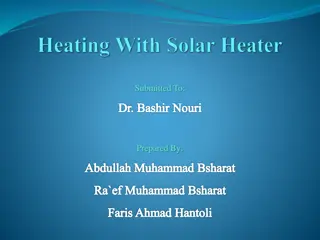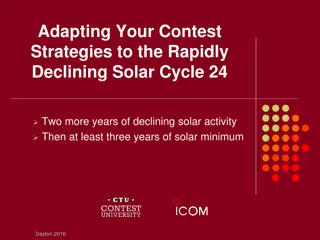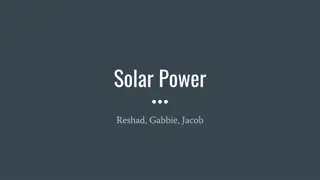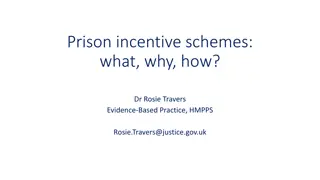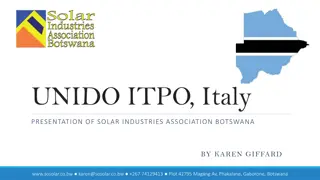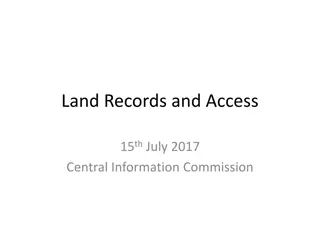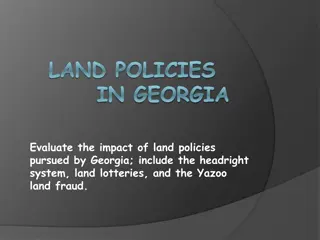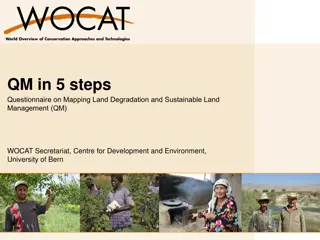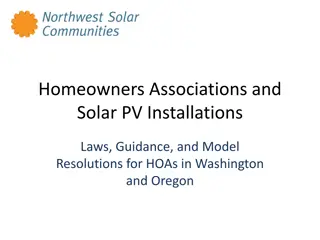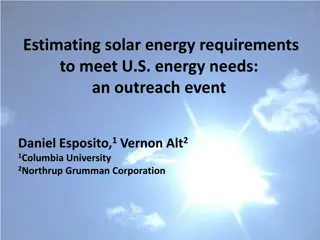Land Use Policy Evolution in Massachusetts Solar Incentive Programs
Evolution of land use policy in Massachusetts solar incentive programs, focusing on Solar Carve-out I and II programs, Solar Massachusetts Renewable Target Program (SMART), and SMART Land Use Policy Incentives. Discusses location-based adders, disincentives, and adder values for various categories of land use.
Download Presentation

Please find below an Image/Link to download the presentation.
The content on the website is provided AS IS for your information and personal use only. It may not be sold, licensed, or shared on other websites without obtaining consent from the author.If you encounter any issues during the download, it is possible that the publisher has removed the file from their server.
You are allowed to download the files provided on this website for personal or commercial use, subject to the condition that they are used lawfully. All files are the property of their respective owners.
The content on the website is provided AS IS for your information and personal use only. It may not be sold, licensed, or shared on other websites without obtaining consent from the author.
E N D
Presentation Transcript
Creating A Clean, Affordable, and Resilient Energy Future For the Commonwealth COMMONWEALTH OF MASSACHUSETTS Charles D. Baker, Governor Karyn E. Polito, Lt. Governor Matthew A. Beaton, Secretary Judith Judson, Commissioner Land Use Policy in Massachusetts Solar Incentive Programs Kaitlin Kelly Renewable Energy Program Coordinator Rhode Island College, Providence, RI November 15, 2017
Evolution of Land Use Policy in MA Solar Solar Carve-out I Program (SREC I) 653MW All projects equally eligible Solar Carve-out II Program (SREC II) 1616 MW Market Sector, SREC Factors, and Managed Growth Higher incentive granted to prioritized sites Large, ground mounted, virtually net-metered projects in capped Managed Growth category (total 126MW) Growth of CSS/ Low Income Housing mitigated limiting impact of Managed Growth Solar Massachusetts Renewable Target Program (SMART) 1600MW Goal Executive Office of Energy and Environmental Affairs directed DOER to focus on land use in development of new program Established Land Use Categories with associated incentive subtractors Category 1 (Ag/ Non-ag); Category 2; Category 3; Prohibited Incentive adders for priority sites Implementing land use performance standards 2 Creating A Clean, Affordable, and Resilient Energy Future For the Commonwealth
SMART Land Use Policy Incentive Location Based adders to incentives Landfill and Brownfield Rooftop Solar Canopy Agricultural Floating Solar Location based adders can be combined with an offtaker based adder, and a storage adder Working with sister agencies in approving projects on unique locations Brownfield- MA Department of Environmental Protection Agricultural- MA Department of Agricultural Resources Floating Solar- MA Department of Environmental Protection/ MA Department of Fish and Wildlife Disincentive Greenfield Subtractor for certain categories of land use 3 Creating A Clean, Affordable, and Resilient Energy Future For the Commonwealth
Adder Values Location Based Adders Off-taker Based Adders Type Adder Value ($/kWh) Type Adder Value ($/kWh) Agricultural $0.06 Community Shared Solar (CSS) $0.05 Building Mounted $0.02 Low Income Property Owner $0.03 Brownfield $0.03 Low Income CSS $0.06 Floating Solar $0.03 Public Entity $0.02 Landfill $0.04 Solar Canopy $0.06 Solar Tracking Adder Energy Storage Adder Type Adder Value ($/kWh) Type Adder Value ($/kWh) Solar Tracking $0.01 Storage + PV Variable 4 Creating A Clean, Affordable, and Resilient Energy Future For the Commonwealth
Encouraging Unique Design Agricultural Generation Unit Dual Use PV installations on working farm land, so that it will not interfere with continued land use Raised structures spaced to allow crop growth, grazing animals, etc. Required to provide annual reports on agricultural productivity DOER developing further guidance with MDAR Approval comes from DOER/ MDAR Floating Solar Installed on bodies of water used for agricultural or industrial activities (i.e. water treatment facilites) Prohibited on natural waterbodies and wetland resource areas Approval comes from DOER/ MassDEP 5 Creating A Clean, Affordable, and Resilient Energy Future For the Commonwealth
Land Use Categories All projects are categorized according to land use Category 1- No Greenfield Subtractor Category 1 Agricultural (facilities located on Land in Agricultural Use or Prime Agricultural Farmland) Agricultural Solar Tariff Generation Units Building Mounted Solar Tariff Generation Units Solar Tariff Generation Units sized to meet no greater than 200% of annual operational load of an agricultural facility Category 1 Non-Agricultural Ground mounted <=500 kW Ground mounted >500 kW and <=5,000 kW that are (1) on land that has been previously developed or (2) on land in a solar overlay district or zoned for solar or power generation Building Mounted, Brownfield, Landfill, Canopy, and Floating Solar Generation Units Category 2- Half Greenfield Subtractor Zoned Commercial/ Industrial and not previously developed Category 3- Full Greenfield Subtractor All other project types Ineligible Land Use Article 97 Land (unless it meets Category 1 criteria) Wetland Resource Areas Historical register sites (except as authorized by regulatory bodies) Previously Developed is defined as having pre-existing paving, construction, or altered landscapes excluding alterations resulting from ag use, forestry, or use as a preserved natural area Project Type Category 3 Category 2 Category 1 Rooftop Brownfields Landfill Canopy Compensation Rate ($/kWh) X X + $0.02 X + $0.03 X + $0.04 X + $0.06 X - $0.0005/acre X - $0.001/acre Base Rate Subtractors Adders 6 Creating A Clean, Affordable, and Resilient Energy Future For the Commonwealth
Land Use Performance Standards All ground mounted facilities must comply with the following performance standards: No removal of all field soils existing leveled field areas left as is without disturbance where soils need to be leveled and smoothed, such as filling potholes or leveling, this shall be done with minimal overall impact with all displaced soils returned to the areas affected; ballasts, screw-type, or post driven pilings and other acceptable minimal soil impact methods that do not require footings or other permanent penetration of soils for mounting are required, unless the need for such can be demonstrated; any soil penetrations that may be required for providing system foundations necessary for additional structural loading or for providing system trenching necessary for electrical routing shall be done with minimal soils disturbance, with any displaced soils to be temporary and recovered and returned after penetration and trenching work is completed; no concrete or asphalt in the mounting area other than ballasts or other code required surfaces, such as transformer or electric gear pads; address existing soil and water resource concerns that may be impacted to ensure the installation does not disturb an existing soil and water conservation plan or to avoid creating a negative impact to soil and water conservation best management practices, such as stimulating erosion or water run-off conditions; limited use of geotextile fabrics; and maintain vegetative cover to prevent soil erosion 7 Creating A Clean, Affordable, and Resilient Energy Future For the Commonwealth
Next Steps SMART Regulations are fully in effect 225 CMR 20.00 DOER is currently developing further guidance on Land Use Categorization, to be released for comment in the coming weeks Program will go into effect next year, likely around late Spring 2018 A 100MW RFP for ground mounted projects released November 13, 2017 Open only to ground mounted projects Eligible projects subject to Greenfield Subtractor, cannot apply for adders Results announced January 11, 2018, setting all program prices 8 Creating A Clean, Affordable, and Resilient Energy Future For the Commonwealth
Thank you Visit our website: https://www.mass.gov/solar-massachusetts-renewable-target-smart Questions: Kaitlin.Kelly@state.ma.us 9 Creating A Clean, Affordable, and Resilient Energy Future For the Commonwealth
